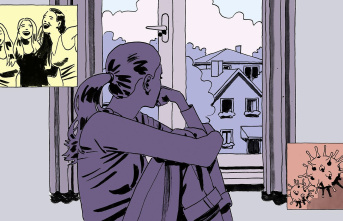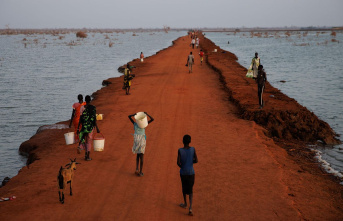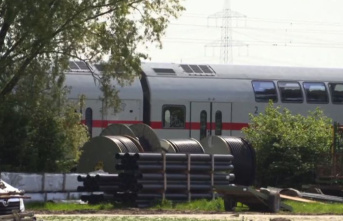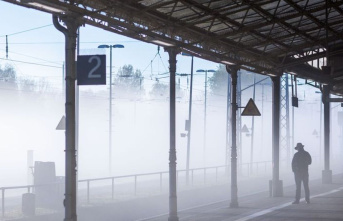In her campaign for chancellor, Baerbock, the top candidate for the Greens, polarized and almost failed, also because of her own mistakes. A year later she is foreign minister - and in the midst of the war the minister with the highest approval ratings. Both are related to each other.
Beaming, Annalena Baerbock grabs the rope on the flagpole and hoists the German flag in front of the reopened embassy in Kyiv. It is a strong symbol that emanates from this act on Monday, not only for the solidarity of the Federal Republic with Ukraine, which was invaded by Russia. It also stands for a woman who has arrived in her role as one of the country's most important decision-makers in the midst of the greatest security policy challenges of recent decades.
When Russian troops invaded Ukraine on the night of February 24, the signal came from Berlin to evacuate the German embassy. To date, the Federal Republic had stuck to staying in Kyiv, even though some EU countries had already withdrawn and ordered their diplomatic staff back for security concerns. But Baerbock and Chancellor Olaf Scholz wanted to stay with Kiev until the end. There was a risk of a repeat of the drama in Kabul just a few months earlier, when embassy employees had to flee from the Taliban who unexpectedly invaded.
At the beginning of the invasion, most observers, including large sections of the German government, expected Russia to march through quickly. It could have ended in disaster for Baerbock: the foreign minister is worried about her employees, but also bears political responsibility for only giving the order for the evacuation at the last minute. "I already decided last night that the remaining seconded staff of the German embassy in Kyiv would be withdrawn for security reasons," Baerbock said, rather casually, the day after, in her first statement on the Russian attack. It is her first major moment of pressure in office - the delicate but successful visit to Sergei Lavrov before the war was considered a kind of baptism - but only one of many in the weeks and months that followed during the war. But the 41-year-old went through a steel bath before taking on one of the most visible and responsible ministerial posts in the republic.
A year ago, in mid-May 2021, the then federal chairwoman of the Greens reached the preliminary peak of her success. She prevailed against her co-chairman Robert Habeck in the struggle for the chancellor candidacy. In polls, the party is well ahead of the Union, while the SPD is far behind. That's when the debates about her person begin: It's about inaccurate information about her academic and professional career, her first jobs, income that was reported belatedly to the Bundestag and finally her book, which was embarrassingly badly copied.
Within a few weeks, the Greens fell to third place in the polls. Critical comments rained down and the social media - spurred on by Russian bot factories and fake news - are dripping with hate, malice and clumsy misogyny. Only she knows how close Baerbock was to giving up everything in these weeks.
She persevered and used the disappointing election result to lead her party back into government for the first time in 16 years. A year after her fall from the summit, the mother of two from Potsdam, along with Habeck, is one of the most popular politicians in the country. In the RTL/ntv trend barometer, 61 percent of those surveyed stated that they were satisfied with Baerbock's work. This is the best value in this ranking. The "Bild" newspaper, which was particularly critical during the election campaign - which, it seemed, together with the "Welt" wanted to prevent Baerbock as head of government - asked this week whether Baerbock wouldn't be the better chancellor?
The business is so fast-paced, with Baerbock also benefiting from the ongoing criticism of the chancellor: Scholz not only gives her the space to shine herself - for example, by stepping up to the first trip to Kyiv by a German government member after the start of the war. Scholz is also not convincing in communicating his Ukraine policy, while the Greens have not had to make any adjustments in their stance on Russia and Ukraine, on Nord Stream 2 and Germany's dependence on Russian raw materials. For Baerbock's party, the important decision to export arms to the Ukraine is only the result of a previously taken position, while the SPD has had to make a U-turn in foreign, security and energy policy since the turn of the year.
So Baerbock is also welcomed in Kyiv with open arms: in addition to Foreign Minister Dmytro Kuleba, with whom she speaks regularly, Mayor Vitali Klitschko and Head of State Volodymyr Zelenskyj also take the time. In the Ukraine, the domestic political debate in the Federal Republic, which is perceived as the leading European nation due to its economic power and population size, is being followed closely. The fact that the Greens have been campaigning for robust support for Ukraine for some time has not gone unnoticed. After the trip there is praise from all sides, from our own ranks, from Klitschko, from the CDU.
When the G7 foreign ministers and then the NATO foreign ministers met in Germany towards the end of the same week, Baerbock led the talks. It is up to her to announce far-reaching decisions: that the G7 will remain resolutely on Ukraine's side and will "never" accept Russian territorial conquests, including Crimea; that NATO welcomes Finland's and Sweden's historic aspirations to join.
With the Turkish threat of a veto against this accession, there is a risk of a small crisis, which is immediately dealt with diplomatically. Baerbock speaks a lot of English and can talk to the press about sensitive diplomatic issues. Even if no one would think of her as a native speaker, the ugly campaign mockery of her language skills seems like something from another time.
Anyone who is well-disposed towards the Chancellor must realize that Scholz leaves his Foreign Minister plenty of room to shine. It was very different for her predecessor Heiko Maas under Angela Merkel. But the federal government as a whole could also benefit from Baerbock's administration. Their determination, their clear communication and the toughness they learned during the election campaign make the Greens appear surprisingly sure-footed on the slippery diplomatic stage. With all slips of the tongue, it happens to her less often that she speaks too fast and her voice cracks.
Showing empathy, being able to talk to people in an informal way and feeling empathy were among her undisputed strengths even during the federal election campaign. In the Kiev suburb of Bucha, where Russian soldiers have been particularly cruel, she succeeds impressively when she sums up her conversations with press representatives. The foreign minister's visit to a market in poverty-stricken Niger, where she tried to lift two buckets filled with melons from a market woman, testifies to this talent for being approachable without putting on too much showmanship.
In addition to pictures that went around the world, the trip to Africa left a particularly strong impression on Baerbock. She is seriously concerned about the looming food crisis due to crop failures in Ukraine. She sees the effects of climate change on people's living conditions and talks about the potentially destabilizing effects on entire regions. "We see and we hear you and we have a responsibility to somehow get this hurricane of crises under control here on site," says Baerbock after speaking to refugee families and school children. Back in Berlin, Baerbock successfully campaigns for the Bundeswehr to continue its mission to protect the civilian population in neighboring Mali - despite the high risks, high costs and manageable popularity in Germany.
Under the traffic light coalition, Germany is assuming even more international responsibility; it's easy to get bogged down here as Foreign Minister. The list of acute trouble spots is far from complete. Fueled by the Russian President, the conflict over the Serbian part of Bosnia-Herzegovina could escalate at any time. Baerbock fears Moldova's destabilization with the Russian-funded separatist region of Transnistria. Added to this are Germany's responsibility for the further fate of Afghanistan, conflicts over the rule of law and democracy with supposed partner countries such as Poland, Hungary and Turkey. In addition, in the coalition negotiations, Baerbock detached climate diplomacy from the Ministry of the Environment and took it over. There are many fires that the unquestionably self-confident and ambitious Foreign Minister has to keep an eye on, if not extinguish.
Against this background, Baerbock would do well to ignore their approval ratings for the time being. After all, it only took twelve months to go from the popular and promising candidate to the disgraced and failed chancellor candidate to the most respected federal minister. Your journey as Secretary of State has only just begun. Whether Germany can entrust one of the highest government offices to a comparatively young woman who has no experience with executive positions - which so many people asked themselves last summer - has not yet been conclusively answered. But the trend is positive, surprising to many.
6












